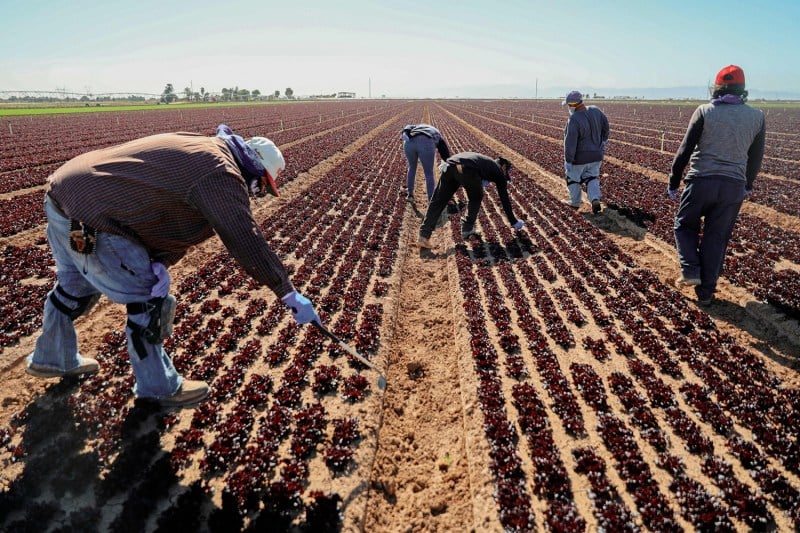Trump’s Trade War Roils a Key Voter Base

Trump’s Trade War Roils a Key Voter Base
American farmers risk becoming “collateral damage” of the U.S. president’s go-to foreign-policy tool.
Farmworkers tend to a lettuce field in Holtville, California, on Feb. 9, 2023. Sandy Huffaker/AFP via Getty Images
U.S. President Donald Trump’s escalating trade war with Canada, Mexico, and China is also roiling one of his key voter bases: American farmers.
Since returning to the Oval Office in January, Trump has wasted no time making tariffs—or, in his vernacular, the “most beautiful word in the dictionary”—the controversial centerpiece of his foreign policy. His administration has unleashed on-again, off-again tariffs against Canada, Mexico, China, and the European Union—measures that have roiled the U.S. stock market and baffled economists who warn that the U.S. economy will pay the price.
U.S. President Donald Trump’s escalating trade war with Canada, Mexico, and China is also roiling one of his key voter bases: American farmers.
Since returning to the Oval Office in January, Trump has wasted no time making tariffs—or, in his vernacular, the “most beautiful word in the dictionary”—the controversial centerpiece of his foreign policy. His administration has unleashed on-again, off-again tariffs against Canada, Mexico, China, and the European Union—measures that have roiled the U.S. stock market and baffled economists who warn that the U.S. economy will pay the price.
They also spell trouble for American farmers, who overwhelmingly backed Trump in the recent U.S. presidential election but are now caught in the crossfire of his intensifying fight with Washington’s three biggest trade partners. Mexico and Canada are two of the United States’ biggest suppliers of agricultural products, according to the U.S. Department of Agriculture, while China is the largest market for U.S. agricultural exports.
“Those are all important markets, and the idea of having trade wars on multiple fronts is actually quite disturbing for the agricultural sector,” said Joseph Glauber, a former chief economist at the Department of Agriculture who is now at the International Food Policy Research Institute. “Just the uncertainty right now is a big concern,” he added.
From fertilizer to livestock, the U.S. agricultural sector is deeply integrated into the global marketplace. Take potash, which is a key fertilizer input. The United States imports 90 percent of its potash supply, 80 percent of which comes from Canada, and farmers have been bracing for spiking prices as a result of the trade spat. Mexico, meanwhile, was the source of 63 percent of U.S. vegetable imports and nearly half of U.S. fruit and nut imports in 2023.
Trump has argued that such agricultural imports hurt American farmers, although he has also acknowledged that there “may be a little bit of an adjustment period” as he imposes tariffs, just like there was during his first-term trade war with China. “Bear with me again, and this will be even better,” he said in his joint address to Congress in March.
“Our new trade policy will also be great for the American farmer—I love the farmer—who will now be selling into our home market, the USA, because nobody is going to be able to compete with you,” Trump declared.
But farmers have historically despised tariffs, said Scott Reynolds Nelson, a historian at the University of Georgia and the author of Oceans of Grain: How American Wheat Remade the World.
“Farmers hate tariffs because it drives up their costs for manufactured goods, and it threatens their markets around the world,” he said, adding that the size of the U.S. agricultural sector makes the country “extremely vulnerable to retaliatory tariffs.”
The sector is no stranger to uncertainty, thanks to past bouts of erratic weather and fluctuating global demand. But the combination of Trump’s aggressive trade policy and his target countries’ retaliatory moves is expected to compound the economic pressures facing farmers, industry experts said.
“U.S. agriculture kind of tends to have a boom-and-bust cycle anyway—and a lot of farmers are used to this—but this would be kind of a self-inflicted bust cycle,” said Christopher Wolf, an agricultural economist at Cornell University. Agricultural exports may be important to farmers, but they account for a relatively small share of U.S. trade, he added.
“If I was them, I would be concerned about being collateral damage,” Wolf said.
Outside of the tariffs themselves, the unpredictability of Trump’s policies is an additional challenge. Trump’s on-again, off-again trade measures fuel uncertainty that make it harder for farmers to plan for the future, said Jill McCluskey, an agricultural economist at Washington State University.
“A lot of farmers have to borrow money to buy their equipment and machinery, which is really expensive,” she said. “If they end up getting less money for their crops, they can go bankrupt.”
And Trump’s own measures are just one source of the economic pressure. As the president expanded his trade war earlier this month, Republican Sen. Deb Fischer, who represents Nebraska, warned that U.S. farmers are an “easy target” for countermeasures.
“When you talk about tariffs, people in ag get a little nervous, because we know we are the easy target for other countries if they are going to retaliate,” Fischer said to Politico.
Countries are already striking back by targeting the U.S. agricultural sector. The European Union’s retaliatory tariffs, for example, hit U.S. soybeans and almonds; China fired back by imposing additional 10 percent to 15 percent tariffs on key agricultural products such as chicken, wheat, corn, pork, soybeans, and beef. In early March, Canada’s countertariffs hit some $5.5 billion in U.S. agricultural products.
“Trying to exert maximum pressure on China is a miscalculation and a mistake,” said Lin Jian, a spokesperson for China’s Foreign Ministry, in a news briefing earlier this month. “If the U.S. insists on waging a tariff war, trade war, or any other kind of war, China will fight till the end.”
All of these tensions hark back to Trump’s first term in office, when the U.S. leader’s trade war with China cost American farmers an estimated $27 billion in lost agricultural exports in 2018 and 2019. The fallout prompted the Trump administration to shell out some $28 billion back to the farmers to cushion the blow and win back their favor. Washington appears ready to offer similar financial support this time around: Starting on Wednesday, the Department of Agriculture will begin accepting applications for economic support for farmers impacted by low commodity prices.
But while that money may have patched things up in the short run, experts said, it also did lasting damage to the U.S. sector as buyers sought alternative markets. After that first trade war, U.S. farmers lost sizable market share for soybean sales to Brazil, which they have still not recovered.
“The fact is that now we look back on it six years later, seven years later, and the long-term impact of that is Brazil now has a commanding position in the China market,” said Glauber, the former Department of Agriculture economist.
If the Trump administration continues to enact sweeping tariffs, U.S. farmers will likely continue to lose out in the global marketplace, said Caitlin Welsh, a food security expert at the Center for Strategic and International Studies.
The “bottom line impact of tariffs is that the United States is not going to be seen as a reliable partner anymore in ag trade,” Welsh said. It will “serve to reinforce that perspective that the United States is not a reliable source, and so it’s going to be harder for American farmers to find buyers for their products.”
This post is part of FP’s ongoing coverage of the Trump administration. Follow along here.
Christina Lu is an energy and environment reporter at Foreign Policy. X: @christinafei
More from Foreign Policy
-

Periodic table The Periodic Table of States
The org chart for a post-Westphalian world.
-

French Emperor Napoleon Bonaparte leads the final assault by the Imperial Guard before his defeat at the Battle of Waterloo in what is today Belgium, on June 18, 1815. The Cost of Ignoring Geopolitics
Like Napoleon and the Ming dynasty, Europe is paying the price for strategic blindness.
-

Donald Trump holds solar eclipse glasses. What I Got Wrong About Trump’s Second Term
I didn’t entirely see this coming. Here’s why.
-

A woman walks past an advertisement for the Russian army at a bus stop. Russia Is Only Winning Inside Trump’s Head
As Russians will tell you, the reality on the ground looks very, very different.








Join the Conversation
Commenting on this and other recent articles is just one benefit of a Foreign Policy subscription.
Already a subscriber?
.
Subscribe
Subscribe
View Comments
Join the Conversation
Join the conversation on this and other recent Foreign Policy articles when you subscribe now.
Subscribe
Subscribe
Not your account?
View Comments
Join the Conversation
Please follow our comment guidelines, stay on topic, and be civil, courteous, and respectful of others’ beliefs.
Change your username |
Log out
Change your username:
CANCEL
Confirm your username to get started.
The default username below has been generated using the first name and last initial on your FP subscriber account. Usernames may be updated at any time and must not contain inappropriate or offensive language.